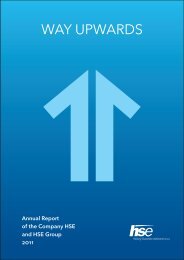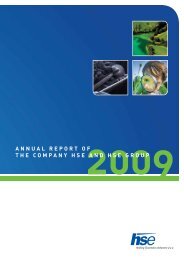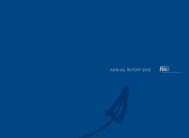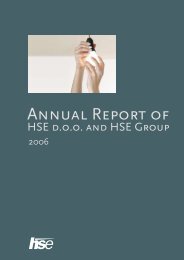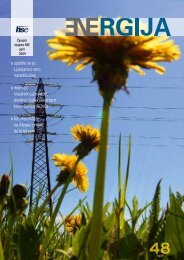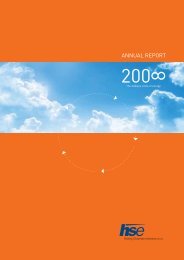Annual report - HSE
Annual report - HSE
Annual report - HSE
You also want an ePaper? Increase the reach of your titles
YUMPU automatically turns print PDFs into web optimized ePapers that Google loves.
• Amendments to IFRS 1 First-time adoption of IFRS - Severe hyperinflation and removal<br />
of fixed dates for first-time adopters, adopted by the EU on 11 December 2012 (effective<br />
for annual periods beginning on or after 1 January 2013).<br />
• Amendments to IFRS 7 Financial Instruments: Disclosures - Offsetting financial assets<br />
and financial liabilities, adopted by the EU on 13 December 2012 (effective for annual<br />
periods starting on or after 1 January 2013).<br />
• Amendments to IAS 1 Presentation of financial statements – Presentation of items<br />
of other comprehensive income, adopted by the EU on 5 June 2012 (applicable to the<br />
annual periods starting on 1 July 2012 or later).<br />
• Amendments to IAS 12 Income Taxes - Deferred tax: Recovery of underlying assets,<br />
adopted by the EU on 11 December 2012 (effective for annual periods starting on or after<br />
1 January 2013).<br />
• Amendment to IAS 19 Employee Benefits - Improvements to the accounting for postemployment<br />
benefits, adopted by the EU on 5 June 2012 (effective for annual periods<br />
beginning on or after 1 January 2013).<br />
• Amendments to IAS 32 Financial Instruments: Presentation - Offsetting financial assets<br />
and financial liabilities, adopted by the EU on 13 December 2012 (effective for annual<br />
periods starting on or after 1 January 2014).<br />
• IFRIC 20 Stripping costs in the production phase of a surface mine, adopted by the EU<br />
on 11 December 2012 (effective for annual periods beginning on or after 1 January 2013).<br />
The company has decided not to adopt these standards, revisions and interpretations<br />
in advance of their effective dates. The company anticipates that the adoption of these<br />
standards, revisions and interpretations will have no material impact on the financial<br />
statements of the company in the period of initial application.<br />
C) Standards and interpretations issued by IFRIC but not yet adopted by the EU<br />
At present, IFRS as adopted by the EU do not significantly differ from regulations adopted<br />
by the International Accounting Standards Board (IASB), except from the following<br />
standards, amendments to the existing standards and interpretations, which were not<br />
endorsed for use as at 28 June 2013.<br />
• IFRS 9 Financial Instruments (effective for annual periods beginning on or after 1 January<br />
2015).<br />
• Amendments to IFRS 1 First-time adoption of IFRS - Government loans (effective for<br />
the annual periods starting on 1 January 2013 or later).<br />
• Amendments to IFRS 9 Financial Instruments and IFRS 7 Financial Instruments:<br />
Disclosures - Mandatory Effective Date and Transition Disclosures.<br />
• Amendments to IFRS 10 Consolidated financial statements, IFRS 11 Joint arrangements<br />
and IFRS 12 Disclosure of interests in other entities - Transition Guidance (effective for<br />
annual periods beginning on or after 1 January 2013).<br />
• Amendments to IFRS 10 Consolidated financial statements, IFRS 12 Disclosure of<br />
interests in other entities and IAS 27 Separate financial statements – Investments<br />
(effective for annual periods beginning on or after 1 January 2014).<br />
• Amendments to various standards - Improvements to IFRSs (2012), resulting from the<br />
annual project for improvement of IFRSs published on 17 May 2012 (IFRS 1, IAS 1, IAS 16,<br />
IAS 32, IAS 34) primarily with a view to remove inconsistencies and to clarify wording, will<br />
need to be applied for annual periods beginning on or after 1 January 2013.<br />
The company anticipates that the adoption of these standards, amendments to the existing<br />
standards and interpretations will have no material impact on the financial statements of<br />
the company in the period of initial application.<br />
At the same time, hedge accounting regarding the portfolio of financial assets and liabilities,<br />
whose principles have not been adopted yet by the EU, is still unregulated.<br />
According to the company’s estimates, application of hedge accounting for the portfolio<br />
of financial assets or liabilities pursuant to IAS 39: Financial instruments: Recognition and<br />
Measurement, would not significantly impact the financial statements, if applied as at the<br />
balance sheet date.<br />
<strong>Annual</strong> Report <strong>HSE</strong> 2012<br />
4 Financial Report of the company <strong>HSE</strong><br />
117





